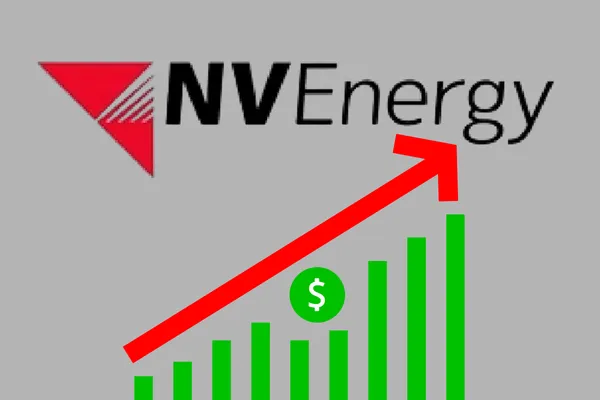WARNING: Energy Rates Are Going Up And Solar Incestives Are Going Away

Read Our Blog Posts Below


⚡ Why Energy Costs Keep Rising in Nevada
Nevada homeowners have seen their energy bills rise faster than ever — and unfortunately, it’s only expected to get worse. If you’re wondering why electricity costs are spiking across the state, here’s what’s driving it:
1. NV Energy Rate Hike Proposals
NV Energy is pushing for a new rate increase that could raise the average residential bill by $15–$20 per month starting this October. The utility claims the increase is necessary to pay for infrastructure upgrades and system improvements.
2. Changes to Net Metering (NEM)
One of the biggest upcoming changes is to Nevada’s net metering program, which credits solar homeowners for the energy they send back to the grid. NV Energy plans to switch to 15-minute intervals for calculating credits starting October 1, 2025. This could significantly reduce the value of those credits, especially for households that don’t have battery storage.
3. Outdated Infrastructure
Much of Nevada’s electrical grid is aging and in need of replacement or expansion. Massive projects like new transmission lines, battery systems, and grid modernization are being funded by passing costs directly onto ratepayers.
4. Exploding Demand: EVs, Data Centers & Population Growth
The rise in electric vehicle ownership, new commercial construction, and data centers in areas like Las Vegas and Reno are placing major new demands on the grid. Add to that Nevada’s booming population, and utilities are struggling to keep up with power needs.
5. Rising Fuel & Inflation Costs
Energy generation still depends heavily on natural gas, which has seen volatile price swings. Combined with inflation, those rising costs are being passed through to homeowners in the form of higher rates.
🔍 What This Means for Homeowners
Between rate hikes, infrastructure costs, and policy changes like NEM reform, Nevada homeowners should expect energy costs to continue rising — and possibly double every five years if not faster.
✅ How to Protect Yourself
Going solar now can help you:
Lock in lower energy costs
Avoid the full impact of upcoming NEM changes
Reduce reliance on the utility grid
Qualify for the 30% federal solar tax credit — before it’s potentially phased out
Waiting could mean paying more and missing out on key incentives. If your home qualifies, now is the time to act.
Want to learn more or get a custom solar quote?
👉 Get your free quote here
See If You Qualify for $0 Down
Find Out If Your Home Qualifies Before Rates Rise and Incentives Disappear
Save On Your Energy Bill
(Even If You’re Not Sure If You Will Qualify)
Stay Informed: Explore Our Latest Posts on Energy Costs and Solar News

⚡ Why Energy Costs Keep Rising in Nevada
Nevada homeowners have seen their energy bills rise faster than ever — and unfortunately, it’s only expected to get worse. If you’re wondering why electricity costs are spiking across the state, here’s what’s driving it:
1. NV Energy Rate Hike Proposals
NV Energy is pushing for a new rate increase that could raise the average residential bill by $15–$20 per month starting this October. The utility claims the increase is necessary to pay for infrastructure upgrades and system improvements.
2. Changes to Net Metering (NEM)
One of the biggest upcoming changes is to Nevada’s net metering program, which credits solar homeowners for the energy they send back to the grid. NV Energy plans to switch to 15-minute intervals for calculating credits starting October 1, 2025. This could significantly reduce the value of those credits, especially for households that don’t have battery storage.
3. Outdated Infrastructure
Much of Nevada’s electrical grid is aging and in need of replacement or expansion. Massive projects like new transmission lines, battery systems, and grid modernization are being funded by passing costs directly onto ratepayers.
4. Exploding Demand: EVs, Data Centers & Population Growth
The rise in electric vehicle ownership, new commercial construction, and data centers in areas like Las Vegas and Reno are placing major new demands on the grid. Add to that Nevada’s booming population, and utilities are struggling to keep up with power needs.
5. Rising Fuel & Inflation Costs
Energy generation still depends heavily on natural gas, which has seen volatile price swings. Combined with inflation, those rising costs are being passed through to homeowners in the form of higher rates.
🔍 What This Means for Homeowners
Between rate hikes, infrastructure costs, and policy changes like NEM reform, Nevada homeowners should expect energy costs to continue rising — and possibly double every five years if not faster.
✅ How to Protect Yourself
Going solar now can help you:
Lock in lower energy costs
Avoid the full impact of upcoming NEM changes
Reduce reliance on the utility grid
Qualify for the 30% federal solar tax credit — before it’s potentially phased out
Waiting could mean paying more and missing out on key incentives. If your home qualifies, now is the time to act.
Want to learn more or get a custom solar quote?
👉 Get your free quote here
Don't Just Take It From Us
See What Our Clients Have To Say
We Work Exclusively With the Highest-Rated Installers and Lenders in the Industry
